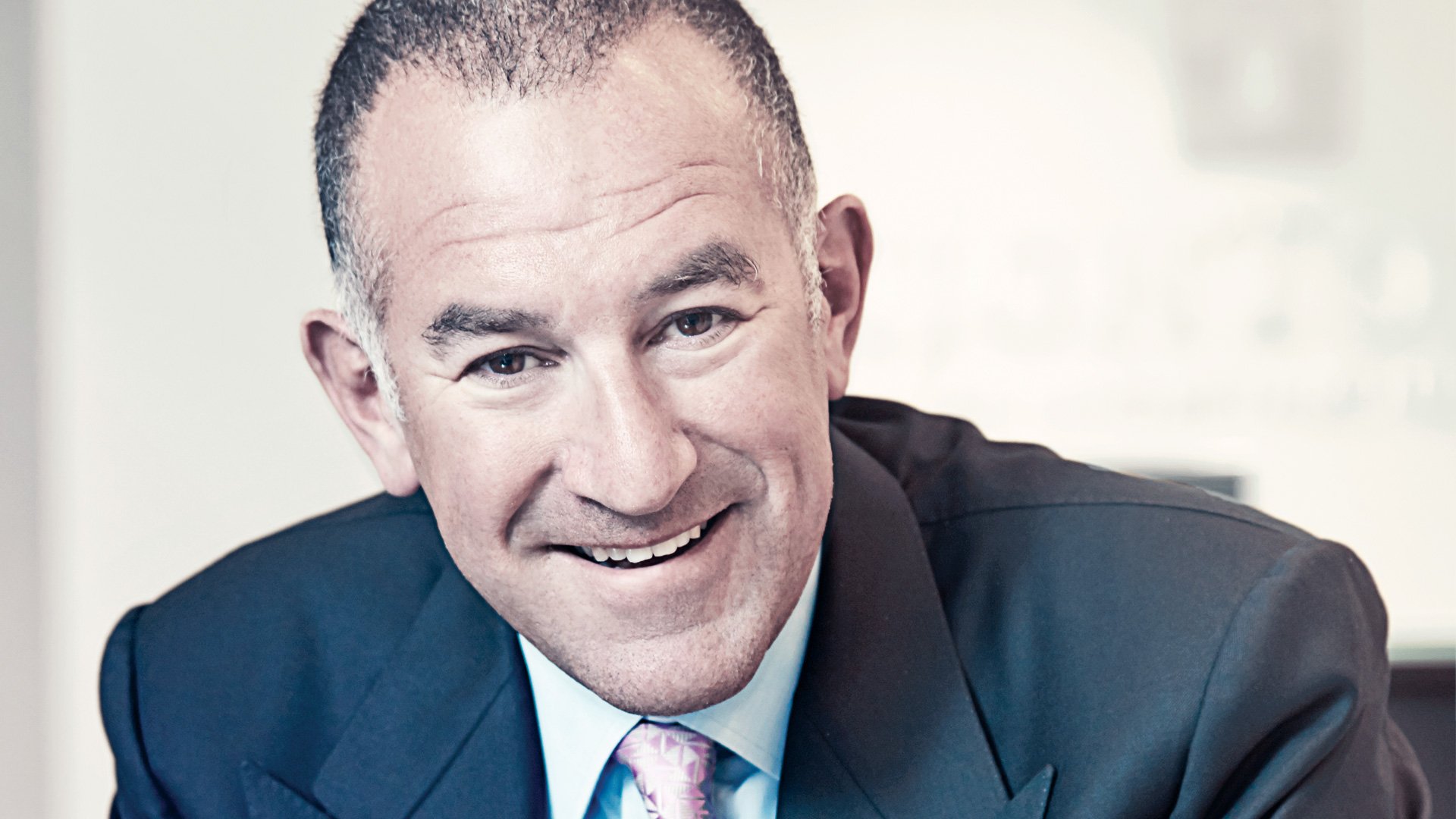In a conference room high over midtown Manhattan, Elliot Weissbluth, the founder and CEO of wealth manage ment firm HighTower, is delivering a lecture. Wielding a black Sharpie like a baton, he’s standing next to an oversized pad propped on an easel, filling page after page with frenetic scrawls. He is outlining HighTower’s origins, and he’s passionate about the subject—this isn’t so much a lecture as a jeremiad.
“What drives me,” he says, “is the challenge of creating a commercial enterprise that makes money by doing the right thing. We’re going to make a lot of money, and I’m perfectly comfortable explaining exactly how. But in the same breath, I can say that we do that without ever compromising about putting the clients’ interest first.”

With help from investors, Weissbluth founded HighTower, which is based in his native Chicago, in 2007. The firm is his attempt to create a new paradigm for the wealth management industry. Coming from a background in law and finance, Weissbluth had grown convinced that the wire house model of broker-dealers and financial advisors making financial recommendations—while earning commissions from products that their employers either created or were paid to sell—was fundamentally corrupt. “It got my blood boiling,” he says. “There was this embedded systemic fraud being perpetuated on a massive number of people, whether they were pensioners or retirees or average people working hard or wealthy people.”
Weissbluth developed the concept of a firm that would be free of conflicts of interest and transparent about its fees. It would offer the fiduciary responsibility of a registered investment advisor (RIA) firm, comforming to guidelines from the SEC instead of FINRA, the financial industry’s self-funded watchdog organization. (“A joke,” Weissbluth calls it.) HighTower wouldn’t sell proprietary financial products. Instead, it would make vendors compete for its business, creating savings for clients. “To the best of my knowledge,” Weissbluth says, “we are the only multi-custodial and multi-clearing firm in the industry, where we are economically dispassionate about where our business goes. We don’t have any economic interest other than to allow the best product at the best price to surface to benefit the client.”
“When I met Elliot, I was immediately impressed by the fact that this was a visionary,” says HighTower’s Pamela Rosenau.
Weissbluth started HighTower in the midst of the financial crisis, wooing teams of unnerved financial advisors away from firms such as Morgan Stanley , UBS and JPMorgan. HighTower advisors are fee-for-service, and their compensation is slightly less than those of wire house advisors. But they have equity; HighTower is now about half owned by investors and half owned by its advisors, Weissbluth says. Forty-six advisor teams have left the wire houses to join HighTower, which now has some $30 billion under management. That’s a pittance compared to the wire houses, but size doesn’t matter so much as viability. There are rumblings of an IPO in HighTower’s future. (For legal reasons, Weissbluth won’t discuss the subject.) A healthy public offering, one that seemed to endorse HighTower’s model, could reshape the world of wealth manage ment. “If a HighTower IPO is success ful,” says one non-HighTower RIA who did not want to be named, “the wire houses should be very afraid. It will mean that financial advisors will have a place where they have a stake in the company and can sleep a little bit better at night.”


In the years since he started HighTower, Weissbluth has been an apparently tireless one-man marketing machine. He appears on CNBC and Fox Business Network. He contributes to the Huffington Post and is a LinkedIn “influencer.” He speaks on panels and at conferences and this year launched HighTower Apex, a two-day affair devoted to “transformation, innovation and provocation” in the financial industry.
If you speak to some of the advisors who’ve joined HighTower, you might get the impression that Weissbluth has founded a cult. “When I met Elliot, I was immediately impressed by the fact that this was a visionary,” says Pamela Rosenau, HighTower’s managing director. Since joining HighTower in 2010, Rosenau adds, she’s only grown more confident in Weissbluth. “I’ve had mentors, but I’ve never had—what would I call it—idols. And I would have to call Elliot an idol.
Former Morgan Stanley advisor Rob Schein, who brought his team to HighTower in 2011, says much the same. “Elliot has the ability to make real change,” Schein says. “He is a special leader.”

He is not yet a well-known one, at least beyond the world of financial advisors. Perhaps it’s because HighTower is a young firm that came quietly into life against the drumbeat of the financial crisis. Perhaps it’s because HighTower is in Chicago, outside the New York media spotlight. Or perhaps it’s because the media finds it easier to cover disruptive innovation in tech than in wealth management, where it is more subtle than, say, a new way to hire a car. But Weissbluth sets the bar high: He wants to follow in the path of innovators such as Richard Branson, Steve Jobs and Elon Musk.
His ambition is rooted in his upbringing. Weissbluth comes from a high-achieving Jewish family; his paternal grandfather was a nuclear physicist at Stanford, and his father, Marc, is a Chicago pediatrician who pioneered research into infant sleep. The women in his family, Weissbluth says, are no shrinking violets either. “My mother is very serious, very smart,” Weissbluth says. “She’s where I get all of my toughness.”
At 47, Weissbluth is confident and charismatic. He’s 6 feet tall, with closely cropped hair and a big smile; he drives two aging Toyota Land Cruisers and recently climbed Mt. Rainier. At times, like when he hears something he doesn’t approve of, he looks like someone you would not want to cross.
As a kid growing up in Chicago, however, he was “a geek,” Weissbluth says. “I didn’t go to parties, I didn’t have a girlfriend. I had my three friends who played Dungeons & Dragons.”

His parents sent him to summer camp at Interlochen, a training ground for future musicians, actors and dancers in northwest Michigan. “I loved being in an environment where everybody was passionate,” Weissbluth recalls. That intensity extended to oratory. “The single most important part of my high school career was being on the debate team—I was state champion.”
Weissbluth may have also honed his skills at public speaking because he’d been diagnosed as profoundly dyslexic. Growing up, he had trouble reading his own handwriting. His class notes were illegible to him, so his parents bought him a Smith-Corona; in class, Weissbluth would listen intently, storing his teacher’s words in his memory, and then, at the end of the day, go home and type up his notes. The disability forced him to focus, to ignore distractions. “If I get distracted even a little bit, I get overwhelmed,” he explains.
The dyslexia also gave Weissbluth a chip on his shoulder, a sense that that he had to work harder than others to keep up. He was a debate geek with dyslexia—talk about an underdog.
After college at Rice, Weissbluth attended Chicago’s John Marshall Law School. “It was a way to make a living that would be lucrative,” he says. “Plus, there was the romanticized notion of fighting for people who can’t fight for themselves.”
“I liked that because elliot was a litigator, he was a tough guy,” says HighTower investor Doug Brown. “You need that to be an entrepreneur.”
He signed up with Chicago firm Sussman Selig & Ross, which specialized in medical malpractice and personal-injury cases. “If debate and theater was like basic swordplay using wooden dowels,” he says, “this was the sharpest edge of the blade on real swords.”
At least in the early going, Weissbluth felt that his mission was righteous. He was standing up for people who’d been harmed. On the other side were “big insurance companies with limitless checkbooks.”
But after six years, Weissbluth had what you might call a crisis of conscience. He won’t go into it on the record, but in one of his LinkedIn essays, called “What Chicago Courtrooms Taught Me About Business,” Weissbluth explained that “I tired of the fight for fight’s sake. My job was to win—without excuses—regardless of the facts….”
Weissbluth had occasionally performed legal services for friends, and now he considered opening a prac tice helping clients who had legal issues with private investments. In stead, he got recruited to do similar work on a larger scale at financial consulting firm Rogerscasey (now Segal Rogerscasey). The job evolved into alternative asset servicing—selling clients, mostly institutional investors, into hedge funds and other alternatives and advocating for the investor in those relationships.
The job gave Weissbluth an inside look at how Wall Street products were marketed and sold. “As an institutional buyer working with very large amounts of money, I was seeing the true cost of the products. The more I learned about it, the more I learned how conflicted and corrupt that system was.”
The concept of HighTower emerged from that growing consciousness, as well as Weissbluth’s own restless ambition: He wasn’t going to change the world serving in someone else’s company. So Weissbluth left Rogerscasey and started his own. To keep a low profile—he didn’t want to attract attention when he hadn’t actually done anything—he picked the tedious (but temporary) name U.S. Fiduciary, and began raising tens of millions of dollars from angel and institutional investors.
“I met Elliot in 2007 and immediately took to him—the industry needed a disruptor,” says Doug Brown, former vice chair of investment banking at Morgan Stanley, now head of DLB Capital in Wilton, Conn. “He understood that if the client does well, the advisor does well.
“I also liked that because Elliot was a litigator, he was a tough guy,” Brown adds. “You need that to be an entrepreneur.”
To develop a company name that would communicate the brand’s values and distinguish it from the wire houses, Weissbluth enlisted the help of Steve Hayden, another Interlochen alum and chief creative officer of Ogilvy Worldwide. “I said that the brand, on day one, had to be perfect,” Weissbluth says. The two friends first eliminated names that sounded anything like a traditional financial firm. “We did a lot of work to make sure it would never sound like Morgan Stanley, Bear Stearns…” Weissbluth says. “We finally settled on a paradigm that was a sort of ancient castle architecture.” They already had a tagline: “An unobstructed view.” The consensus: Why not just call the new firm “High Tower”? It was Hayden who suggested connecting the words while retaining the capital “T.”
Even with the new name in hand, Weissbluth kept a low profile. “I decided that we were going to be in ‘Batman mode,’” he explains. “We leaked that we started the business, that we were raising money. But we had a website that was only a single page, with no way to contact us, just telling people what we stood for. Batman mode gave us cover—we could tell people what we stood for without telling them what we were going to do.”
When Weissbluth started, he had the advantage of relative anonymity and the fact that the financial crisis had caused turmoil in the wealth management industry, weakening long-established relationships between advisors and their employers while fostering public distrust of the big banks. HighTower is no longer so secret, and Americans are starting to forget about the crisis. Still, the wire houses “are very scared” of HighTower, claims Pamela Rosenau. “We’re a fierce competitor.”
In February 2010, Morgan Stanley Smith Barney filed a lawsuit against five advisors who had jumped ship for HighTower, claiming that the advisors had violated industry protocols. Weissbluth called the lawsuit a “failed intimidation tactic,” and an arbitrator came down in the middle. Now, says Doug Brown, “there are no more lawsuits. People know they can’t intimidate us.”
“We have a very strong track record of winning these cases [involving industry protocol], which is hardly legal intimidation,” says James Wiggins, head of corporate communications for Morgan Stanley Wealth Management. “As for HighTower, it is a relatively small operation and its activities have had no impact on our business model.”
Weissbluth feels differently. “If somebody’s offended by what we’re doing,” he says, “then they have an economic interest in perpetuating the deception of the current business model.” But he’s focused on the future. On the question of an IPO, he will say only, “We’re considering our options and obviously an IPO is one of those options.” The most exciting possibility for him, Weissbluth insists, is the opportunity to change the financial world.
“We’re proving that we can do it,” he says. “Now, I get to go to work every day and continue to win.”







